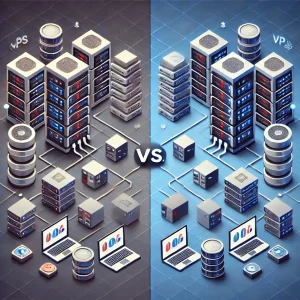In today’s digital landscape, understanding different hosting types is crucial for the success of your website. Different hosting types cater to various needs, ranging from small personal blogs to large e-commerce platforms. This guide will provide an in-depth look into the various hosting types, their advantages, disadvantages, and ideal use cases to help you make an informed decision.
1. Shared Hosting
Definition: Shared hosting is a type of web hosting where multiple websites share the same server and its resources, including CPU, RAM, and disk space. This is the most basic and cost-effective hosting option available. Understanding different hosting types starts with recognizing the most commonly used shared hosting.
Advantages:
- Cost-Effective: Shared hosting is the most affordable hosting option, making it ideal for beginners and small websites with low traffic.
- Ease of Use: Most shared hosting plans come with user-friendly control panels (like cPanel), making it easy to manage your website.
- Maintenance: Server maintenance, updates, and security are handled by the hosting provider, freeing you from technical responsibilities.
Disadvantages:
- Limited Resources: Since resources are shared among multiple websites, high traffic on one site can affect the performance of others.
- Less Control: Limited control over server settings and configurations.
- Security Risks: Shared environments are more vulnerable to security breaches since an attack on one site can potentially affect others.
Ideal For:
- Personal blogs
- Small business websites
- Brochure websites
2. Virtual Private Server (VPS) Hosting
Definition: VPS hosting uses virtualization technology to provide you with dedicated resources on a shared server. Each VPS operates independently, giving you more control and flexibility compared to shared hosting. In understanding different hosting types, VPS hosting offers a middle ground between shared and dedicated hosting.
Advantages:
- Dedicated Resources: You have dedicated resources, which translates to better performance and reliability.
- Scalability: Easily scalable to accommodate growing traffic and resource needs.
- Greater Control: More control over server configurations and software installations.
Disadvantages:
- Cost: More expensive than shared hosting, but still affordable.
- Technical Knowledge: Requires a certain level of technical knowledge to manage the server effectively.
- Maintenance: Although the hosting provider handles hardware maintenance, you are responsible for software updates and security.
Ideal For:
- Growing websites with moderate traffic
- E-commerce sites
- Websites requiring custom software or configurations
3. Dedicated Hosting
Definition: Dedicated hosting provides an entire server exclusively for your website. This type of hosting offers the highest level of performance, control, and security, which is essential in understanding different hosting types for large-scale operations.
Advantages:
- Maximum Performance: Since you have an entire server to yourself, you benefit from maximum performance and reliability.
- Full Control: Complete control over server configurations, including operating system, software, and security settings.
- Enhanced Security: Higher security as you are not sharing resources with other websites.
Disadvantages:
- High Cost: Dedicated hosting is the most expensive option, making it suitable for large businesses or high-traffic websites.
- Technical Expertise: Requires advanced technical knowledge to manage and maintain the server.
- Maintenance Responsibility: You are responsible for all aspects of server maintenance, including updates and security.
Ideal For:
- Large e-commerce sites
- High-traffic websites
- Websites requiring maximum security and performance
4. Cloud Hosting
Definition: Cloud hosting uses a network of virtual servers to host websites. Resources are drawn from multiple physical servers, offering scalability and flexibility, making it a vital aspect of understanding different hosting types.
Advantages:
- Scalability: Easily scalable to handle traffic spikes and growth.
- Reliability: High reliability as resources are distributed across multiple servers, minimizing downtime.
- Pay-As-You-Go: Cost-effective pricing model where you pay only for the resources you use.
Disadvantages:
- Variable Cost: Costs can vary based on usage, making it hard to predict expenses.
- Complexity: Can be complex to manage, especially for users unfamiliar with cloud infrastructure.
- Security: While generally secure, cloud environments can be vulnerable to data breaches if not properly managed.
Ideal For:
- Websites with fluctuating traffic
- Startups and growing businesses
- Websites requiring high availability and redundancy
5. Managed Hosting
Definition: Managed hosting is a service where the hosting provider manages the server, including setup, maintenance, security, and updates. This allows you to focus on your website and business, an important consideration in understanding different hosting types.
Advantages:
- Hassle-Free: The hosting provider handles all technical aspects, including security, updates, and backups.
- Support: Access to expert support for server-related issues.
- Performance Optimization: Providers often optimize server performance to ensure your website runs smoothly.
Disadvantages:
- Cost: Managed hosting is more expensive than unmanaged hosting due to the added services.
- Less Control: Limited control over server configurations as the provider manages the environment.
- Dependence on Provider: You rely on the provider for all server-related tasks, which can be a drawback if their service is subpar.
Ideal For:
- Businesses without in-house IT staff
- Websites requiring high performance and security
- Users who prefer to focus on their website content and business
6. Colocation Hosting
Definition: Colocation hosting involves renting space in a data center to house your physical server. The data center provides power, cooling, bandwidth, and security while you own and maintain the server. Understanding different hosting types includes recognizing the specialized needs that colocation hosting addresses.
Advantages:
- Control: Complete control over your hardware and software configurations.
- Scalability: Easy to scale by adding more hardware.
- Security: High physical security provided by the data center.
Disadvantages:
- Cost: High initial costs for purchasing and setting up your hardware.
- Technical Expertise: Requires technical knowledge to manage and maintain your server.
- Maintenance Responsibility: You are responsible for all aspects of server maintenance, including hardware repairs and updates.
Ideal For:
- Large enterprises with IT staff
- Businesses requiring specific hardware configurations
- Organizations needing high physical security and control
7. WordPress Hosting
Definition: WordPress hosting is a type of hosting specifically optimized for WordPress websites. It can be shared, VPS, or dedicated hosting with added features tailored for WordPress. Understanding different hosting types also means recognizing the niche solutions like WordPress hosting.
Advantages:
- Optimized Performance: Servers are optimized for WordPress, ensuring better performance and faster load times.
- Easy Setup: Often includes pre-installed WordPress, themes, and plugins.
- Support: Access to WordPress-specific support and resources.
Disadvantages:
- Cost: Can be more expensive than generic hosting plans.
- Limited to WordPress: Only suitable for websites built on WordPress.
- Less Flexibility: May have restrictions on certain plugins and customizations.
Ideal For:
- WordPress blogs
- WordPress e-commerce sites
- Users who want an optimized WordPress experience
Conclusion
Understanding different hosting types depends on your specific needs, budget, and technical expertise. For beginners and small websites, shared hosting offers an affordable and user-friendly option. As your website grows, VPS hosting provides more resources and control. Dedicated hosting is ideal for high-traffic websites requiring maximum performance and security. Cloud hosting offers scalability and reliability for growing businesses, while managed hosting provides a hassle-free experience. Colocation hosting is best for enterprises needing full control over their hardware. Finally, WordPress hosting is tailored for WordPress sites, ensuring optimized performance.
By understanding different hosting types and their respective advantages and disadvantages, you can make an informed decision that aligns with your website’s requirements and future growth.





